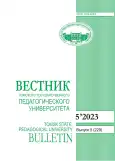Возможности развития личности школьников в иммерсивной образовательной среде
- Авторы: Алексеева О.В.1, Александрова Н.В.1, Скворцова Т.П.2, Бурцева Д.Я.1
-
Учреждения:
- Новгородский государственный университет имени Ярослава Мудрого
- Институт художественного образования и культурологии Российской академии образования
- Выпуск: № 5 (2023)
- Страницы: 7-16
- Раздел: ОБЩЕЕ ОБРАЗОВАНИЕ
- URL: https://bakhtiniada.ru/1609-624X/article/view/269067
- DOI: https://doi.org/10.23951/1609-624X-2023-5-7-16
- ID: 269067
Цитировать
Полный текст
Аннотация
Об авторах
Ольга Вячеславовна Алексеева
Новгородский государственный университет имени Ярослава Мудрого
Email: roolalex@ya.ru
кандидат педагогических наук, доцент, заместитель начальника управления аспирантуры и ординатуры Великий Новгород, Россия
Наталья Викторовна Александрова
Новгородский государственный университет имени Ярослава Мудрого
Email: natalia_nov75@mail.ru
кандидат психологических наук, доцент Великий Новгород, Россия
Татьяна Петровна Скворцова
Институт художественного образования и культурологии Российской академии образования
Email: tanechk-a@bk.ru
кандидат педагогических наук Москва, Россия
Дарья Ярославовна Бурцева
Новгородский государственный университет имени Ярослава Мудрого
Email: darya.burtseva@novsu.ru
аспирант, заведующий лабораторией "виртуальной и дополненной реальности" Великий Новгород, Россия
Список литературы
- Степанова Н. А. Особенности интеграции эмоциональной, волевой и мотивационной сфер личности младшего школьника на протяжении обучения в начальной школе // Ученые записки университета Лесгафта. 2011. № 9. C. 134–140.
- Алексеева О. В., Александрова Н. В., Скворцова Т. П. Возможности развития учебно-познавательной компетентности младших школьников в виртуальной реальности // Научно-педагогическое обозрение. 2022. № 4 (44). С. 16–24. doi: 10.23951/2307-6127-2022-4-16-24
- Bowman D. A., McMahan R. P. Virtual Reality: How Much Immersion Is Enough? // Computer. 2007. Vol. 40 (7). P. 36–43. doi: 10.1109/MC.2007.257
- O’Beirne R. From Lending to Learning. Chandos Publishing, 2010. 216 p.
- Hillmayr D., Ziernwald L., Reinhold F., Hofer S.I., Reiss K. M. The potential of digital tools to enhance mathematics and science learning in secondary schools: A context-specific meta-analysis // Computers & Education. 2020. Vol. 153. URL: https://www.sciencedirect.com/science/article/pii/S0360131520300968 (дата обращения: 17.03.2023). Doi.org/10.1016/j.compedu.2020.103897
- Meyer O. A., Omdahl M. K., Makransky G. Investigating the effect of pre-training when learning through immersive virtual reality and video: A media and methods experiment // Computers & Education. 2019. Vol. 140. Doi.org/10.1016/j.compedu.2019.103603
- Ватлецов С. Г., Ватлецова Е. К. Цифровой след как цифровая копия человека // Государство и право в изменяющемся мире: правовая система в условиях информатизации общества: материалы IV науч.-практ. конф. c междунар. участием. Н. Новгород: Автор, 2019. C. 365–369.
- Емелин В. А. Утрата приватности: идентичность в условиях технологического контроля // Национальный психологический журнал. 2014. № 2. С. 19–26. doi: 10.11621/npj.2014.0203
- Falloon G. Using simulations to teach young students science concepts: An Experiential Learning theoretical analysis // Computers & Education. 2019. Vol. 135. P. 138–159. https://doi.org/10.1016/j.compedu.2019.03.001
- Chan Ph., Gerven T. V., Dubois J.-L., Bernaerts K. Virtual chemical laboratories: A systematic literature review of research, technologies and instructional design // Computers and Education Open. 2021. Vol. 2. Doi.org/10.1016/j.caeo.2021.100053
- Spiers E., Slocombe W., Maltby J., Dedopulos T., Stolze G., Goodenough P., Claridge R., Mason L., Biggs J., Norris J. Estrangement, immersion, and the future: Designing the speculative environments of the virtual reality «Museum of the Future» // Futures. 2022. Vol. 138. Doi.org/10.1016/j.futures.2022.102922.
- Werfhorst H. G. van de, Kessenich E., Geven S.The digital divide in online education: Inequality in digital readiness of students and schools // Computers and Education Open. 2022. Vol. 3. doi: 10.1016/j.caeo.2022.100100
- Borgonovi F., Pokropek M. The evolution of the association between ICT use and reading achievement in 28 countries // Computers and Education Open. 2022. Vol. 2. doi: 10.1016/j.caeo.2021.100047
- Torres C. E. T., Rodríguez J. C. Educação e Pesquisa Los entornos de aprendizaje inmersivo y la enseñanza a ciber-generaciones Immersive learning environments for teaching the cyber generations // Educação e Pesquisa. 2019 Vol. 45. doi: 10.1590/S1678-4634201945187369
Дополнительные файлы







